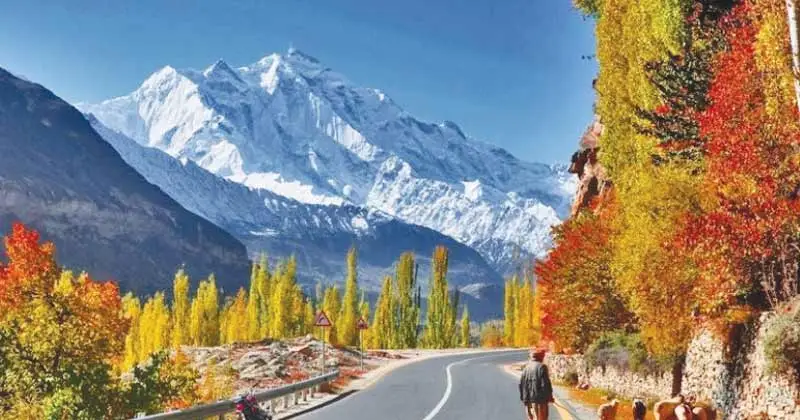Gilgit-Baltistan (GB), Pakistan’s northern region, connects Pakistan with China and serves as the Pakistani starting point for the much-touted China-Pakistan Economic Corridor (CPEC). Although the region has been under Pakistan’s administrative control for all practical purposes since 1947, its constitutional status is in doubt due to its legal ties to India and Pakistan’s long-running Jammu and Kashmir dispute.
Even though the people of the region considered themselves distinct from Kashmiris at the time of Partition, Pakistan’s international position on August 14, 1947, is that GB is part of Kashmir. In 1947, the people of today’s GB revolted against Dogra rule, motivated by anti-India and anti-Kashmir sentiments. In 1948, the region formally joined Pakistan.
Why did Pakistan decide to Merge GB?
Pakistan made the decision to merge GB with Kashmir on the assumption that it would help the country gain more votes in a potential United Nations plebiscite on Kashmir. Despite its association with the Kashmir dispute, the administrative arrangements of GB differ from those of Azad Jammu and Kashmir (AJK), which has its own constitution, whereas GB is administered by the center in Islamabad.
People of GB Demand Their Constitutional Rights:
The people of GB are united in their demand for constitutional rights, as evidenced by a joint resolution passed by the Legislative Assembly demanding interim provincial status. All major political parties in Pakistan have shared the goal of granting constitutional rights to the people of GB. Former Prime Minister Zulfikar Ali Bhutto is credited with repealing the draconian Frontier Crimes Regulations (FCR), effectively putting an end to local raja rule and forced labor in the former Northern Areas. Later, under then-Prime Minister Benazir Bhutto, the Pakistan People’s Party introduced the first party-based elections in 1994, and in 2009, under Yousaf Raza Gillani, the GB Empowerment and Self-Governance Order were promulgated, giving the region its current name.
The then-ruling Pakistan Muslim League Committee Nawaz’s on Constitutional and Administrative Reforms, led by Sartaj Aziz, recommended in 2015 that the area be given “provisional provincial” status until the Kashmir dispute was resolved. This was followed by a landmark decision by Pakistan’s Supreme Court in January 2019 that ordered the people to be granted legal status and constitutional rights.
26th Amendment:
On November 1, 2020, then-Prime Minister Imran Khan announced his government’s intention to grant the region provisional provincial status, effectively making it Pakistan’s fifth province. The announcement followed a high-profile meeting on the status of GB attended by both government and opposition parties, which resulted in the draught 26th amendment to the constitution. The amendment, if passed by a two-thirds majority in Parliament, would have granted GB provisional provincial status without affecting Pakistan’s position on the Jammu and Kashmir issue, as per U.N. resolutions.
With a new government in place, there is a risk that the push for GB’s status will lose steam, as the leadership is likely to prioritize other pressing issues, such as the economy and energy crisis, during their one-year term. However, because the issue of granting provisional provincial status has previously received bipartisan support, the government may continue to push it forward with incremental steps in order to maintain momentum.
If the proposed constitutional amendment bill is passed by Parliament, it will address some of the people’s constitutional demands and result in three major changes. First, it will allow people from the GB to be represented in Parliament. Second, the Supreme Court of Pakistan’s jurisdiction may be extended to GB following the abolition of its Supreme Appellate Court. Third, the GB Election Commission will be merged with the Pakistani Election Commission. Provisional provincial status may not address all of the people’s concerns, including the transfer of administrative, financial, and legislative powers in accordance with the 18th amendment. Nonetheless, it will be a concrete first step toward addressing the region’s constitutional ambiguity.
Any such move, however, is not without complications. While much work has already been done on the administrative front, the current Parliament lacks the two-thirds majority required to pass the proposed 26th constitutional amendment. Furthermore, given the economic crisis, a comprehensive financial implication plan will be required to assess the fiscal ramifications of this move. GB will also have to fulfill its end of the bargain. To be included in the National Finance Commission (NFC) framework for resource mobilization, GB must expand its own resource potential and enter the direct tax net.
Political Difficulties:
There are also some political difficulties. Historically, any move toward granting GB provisional provincial status has been met with opposition from the Azad Jammu and Kashmir (AJK) government, which maintains that the former is an integral part of Kashmir and that any change in its status will harm Pakistan’s case in the United Nations. As a result, it is critical to trust the entire Kashmiri leadership on both sides of the Line of Control (LoC). Finally, granting de facto provincial status is likely to provoke a massive backlash from India, which has repeatedly staked its claim to this territory and threatened to take it by force in recent years.
The rightful demand of the people of Gilgit-Baltistan for constitutional rights received a lot of attention after India revoked Article 370 of the Indian Constitution and stripped Indian-occupied Kashmir of its special status on August 5, 2019. Constitutional amendments were also deemed necessary to protect the legal position of the China-Pakistan Economic Corridor (CPEC), which runs through the GB region. Most importantly, provisional provincial status is required for the people of this region, who deserve and demand that their fundamental rights be respected and protected.
